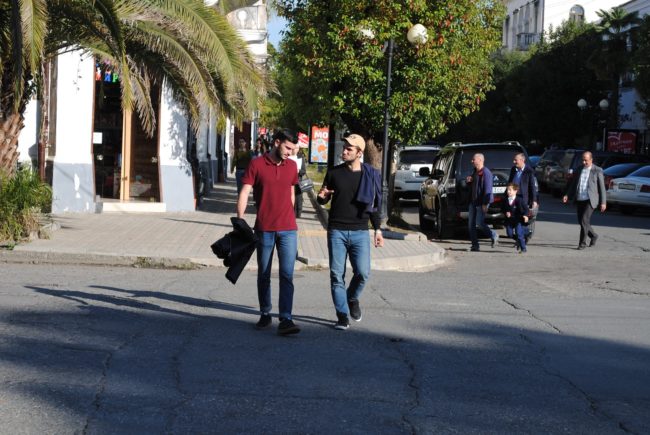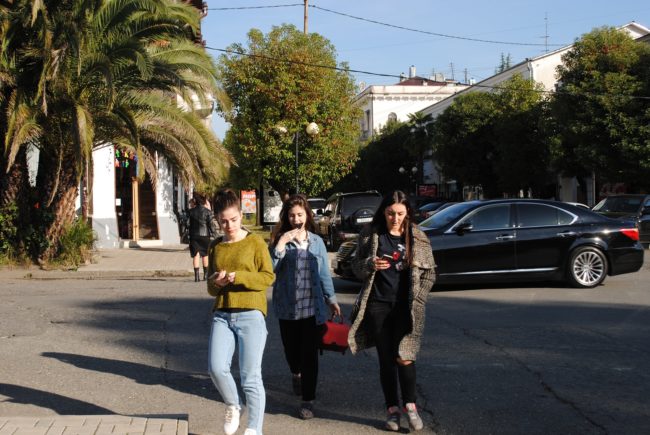

 An entire generation has grown up in Abkhazia with no direct experience of the 1992–1993 war. For many of these young people, a collective memory of the conflict still persists, and attitudes towards Georgia and Georgians are often extremely hostile.
An entire generation has grown up in Abkhazia with no direct experience of the 1992–1993 war. For many of these young people, a collective memory of the conflict still persists, and attitudes towards Georgia and Georgians are often extremely hostile.
[Read in Georgian — სტატია ქართულ ენაზე]
‘We lost too much in this war to forgive them’
Madina, a 22-year-old student at the Abkhazian State University’s (ASU) Department of Philology, says friendly relations between Georgia and Abkhazia are impossible.
‘We lost too much in this war to forgive them. I am not a nationalist, but I find them unpleasant’, Madina tells OC Media.
According to her, Georgia had ambitions of colonising Abkhazia during Soviet times. As proof, Madina cites the large numbers of Georgians moving to Abkhazia and occupying high-ranking official positions during those times.
‘I consider all the campaigns Georgia conducts to be clownish, they simply present themselves as clowns before the whole world. For example, “The Road to Sokhumi” campaign [where activists drove a carcade to Anaklia, close to Abkhazia, waving Georgian flags and slogans against “Russian occupation”]. In this case, they showed they have nothing better to do. It’s absolute fanaticism, it’s ridiculous and just stupid. How can they even talk about return and reconciliation? This will never happen’, she says.
‘I am certain I will never marry a Georgian girl’
Adgur Mindzhiya a law student at ASU, says he has painful associations with the conflict because his uncle who was only 19 years old, died in the fighting,.
‘He was the only son in the family, and for our family this is a pain that doesn’t lessen. I am afraid to imagine that anyone in our family could ever dare to say in the near future we will be friends with Georgians. This sentiment would not be understood and would certainly be judged’, Adgur tells OC Media.
He says he does not consider himself or his family nationalistic, but that Georgians are an exception. He notes he would not be able to marry a Georgian girl, and thinks that neither would his sister marry a Georgian man.
‘After all, I think you should marry your own, so there are no conflicts in the family’, he adds.
He does not see any possibility of a relationship between Abkhazia and Georgia.
‘Abkhazians and Georgians need dialog’
According to Liana Kvarcheliya, from the Centre for Humanitarian Programmes, an Abkhazian NGO, young people in Abkhazia and Georgia are completely different, making it difficult for them to understand each other.
‘The youth of Abkhazia was born after the war and grew up in ruins, therefore they have an idea of what war is, and almost every family has someone who was killed. As for Georgian youth, they have a different view, they only know what they have been told all these years’, Kvarcheliya told OC Media.
She adds that young people from Abkhazia and Georgia communicate via a number of platforms and even manage to agree on things and understand each other. But after every campaign by Georgia towards Abkhazia, all agreements and understandings are simply forgotten, she notes.
‘Recently I was following a campaign on social networks where young Georgians shared pictures with the writing “I am from Georgia, my country is occupied by Russia”. There was a negative reaction to this in Abkhazian society. Georgia is trying to divert all conversations about its aggression in 1992–1993, and puts an emphasis on Russian–Georgian relations’, Kvachelia explains.
She thinks although Georgia attempts to build dialogue with Abkhazia, it destroys all understanding with these sorts of campaigns. Kvarchelia adds that dialogue is necessary, but Georgia sometimes acts unfairly.
‘I welcome a multilateral approach, Abkhaz and Georgian youth should communicate, but I consider it unfair when Georgia tries to limit the presence of Abkhazian youth at various international venues. When this stops, then maybe relations between our countries will improve’, she says.
One example was the 2015 International Freestyle Wrestling Tournament held in Yerevan. Athletes from Abkhazia, Iran, Georgia, Daghestan, Ingushetia, North Ossetia, Azerbaijan, and Ukraine were invited to participate in the tournament. However, after the intervention of the Georgian Embassy in Armenia, Abkhazian athletes were excluded from the tournament. It is at the insistence of the Georgian authorities that many countries refuse to accept the Russian passports of Abkhazians, which are issued by the Russian Embassy in Sukhum.

Abkhazians who go to Georgia ‘are traitors’
Astanda, a graduate from Sochi State University’s Economics and Governance Department, says Georgia is hampering the development of Abkhazia by not allowing children to participate in sports competitions, concert performances, and contests in other countries.
She says Abkhazians who go to Georgia are traitors, regardless of the purpose of their travel.
‘Such people should be immediately jailed or not allowed entry back to Abkhazia at all’, Astanda says.
The 24-year-old declares categorically that there is no future for relations between Abkhazia and Georgia.
‘These are not people with whom we can renew relations. Only once Georgia accepts Abkhazia’s independence can we talk about further steps’, she asserts. Even if this were to happen, she would be against the return of refugees, she says.
The question of refugees returning to Abkhazia is a cause of much resentment. Most Abkhazians concur that refugees have nowhere to return anyway, since their houses have long been occupied by other people.
Georgian refugees are ready to return to Abkhazia
CRRC, a Caucasus-based think tank, and Conciliation Resources, an international peacebuilding group, conducted a poll in 2010 of 1,000 refugees from Abkhazia to assess their attitudes towards returning to Abkhazia.
Among the respondents, 87% declared that they would consider returning to Abkhazia if it were under Georgia’s control, with only 9% saying they would do so if Abkhazia remained outside of it.
In addition, 50% said they could not return to Abkhazia because their houses had been destroyed.
Among the respondents, 85% said they considered the ability to travel to Abkhazia important. The primary reason given wanting to travel there was to visit the graves of relatives and take care of property.
‘I am really sorry for people who believe in Georgian sincerity’
Adgur, a 25-year-old civil servant who asked that his full name and place of work not be mentioned asserts that Georgia cannot be trusted.
‘I am really sorry for people who believe in Georgian sincerity. I sometimes ask if these people are normal, if they are conscious. We stopped noticing or we don’t want to notice that Georgia, with its “friends”, has changed its policy, regrouped, and set the goal of peacefully conquering Abkhazia’, says Adgur.
According to him, Georgia spends large sums of money reaching in the millions of dollars, funnelled from America, to convince Abkhazians to trust Georgia.
‘The first stage is to implant tolerance and understanding of the “insignificance of the conflict” of 1992–1993 into the minds of our people. The second stage — intensify communication between people from Abkhazia and Georgia at different levels’, he says.
Adgur is confident that Georgia is conducting a determined campaign planned for many years in advance to win over the Abkhaz youth.
‘We will not even notice how it happens, but if our youth is led on by this, we will disappear as a nation, as an independent state. Because then all the refugees will return, and after them — the Georgians’, he concludes.
‘All will be forgotten in time’
Alina says that many in Abkhazia do not share her point of view. The 21-year-old student of journalism at ASU said she does not feel resentment towards any other nationalities.
‘I had the chance to meet young people from Georgia, and you know, it seems they are excellent guys and they are far removed from these conflicts. At least those with whom I talked are very friendly, and we still communicate over social networks’, Alina says.
She thinks connections between Georgia and Abkhazia will one day be restored. The generation that remembers the war will be gone, she notes, while a new generation is growing and does not know anything about the conflict.
‘The new generation simply does not care whether there was a war. They have very different interests and plans for life, many of them do not associate their life with Abkhazia’, Alina says.
The issue of refugees, according to Alina, is still too early to consider: one first needs to establish a working dialogue, she says.
All place names and terminology used in this article are the words of the author alone, and may not necessarily reflect the views of OC Media’s editorial board.








